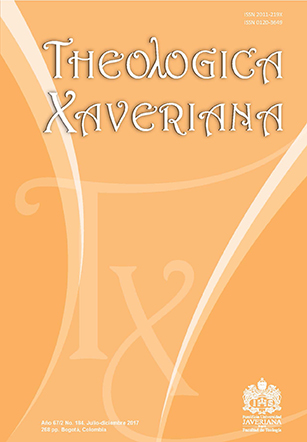Abstract
The article aims to compare the results of Israel’s main political-religious reforms in the name of monotheism with the message of Joel. It describes the reforms of Hezekiah and Josiah, and also the ethnic reform of Ezra and Nehemiah. Later, these reforms are compared with Joel’s universalist and liberating message, stressing on the pericopes of Joel 3,1-5 and 4,4-8. Thus, this is mainly a bibliographical research. The result of this research shows that the institution of monotheism was ambiguous and it oscillated between oppression and humanization. While Ezra and Nehemiah’s monarchist reform served to political and domination purposes, Joel’s message contributed to more inclusive and liberating actions.
Bíblia Sagrada Online. Edição Pastoral. Disponível em: Paulus Editora, http://www.paulus.com.br/biblia-pastoral/_PTG.HTM (acesso em 25 novembro 2014).
Croatto, José Severino. Historia de salvación: la experiencia religiosa del pueblo de Dios. Estella (Navarra): Verbo Divino, 1995.
_____. Isaías: la palabra profética y su relectura hermenéutica. Vol. 2. Buenos Aires: Lumen, 1994.
Dietrich, Luiz José. Violências em nome de Deus. São Leopoldo (RS): CEBI, 2013.
Donner, Herbert. História de Israel e dos povos vizinhos: da época da divisão do reino até Alexandre Magno. São Leopoldo: Sinodal, 2006.
Fernandes, Leonardo Agostini. O anuncio do Dia do Senhor: significado profético e sentido teológico de Joel 2,1-11. São Paulo: Paulinas, 2014.
Fohrer, Georg. História da religião de Israel. São Paulo: Paulinas, 1983.
Gallazzi, Sandro. “Por medio de él: el designio de Dios ha de triunfar”. Revista de interpretación bíblica latinoamericana 21 (1995): 11-34.
Godoy, Daniel. “O derramamento do espírito: fortalecimento dos enfraquecidos”. Tese (Doutorado em Ciências da Religião), Universidade Metodista de São Paulo, Faculdade de Filosofia e Ciências da Religião, São Paulo, 2001.
Hubbard, David Allan. Joel e Amós: introdução e comentário. São Paulo: Vida Nova, 1996.
Kapelrud, Arvid S. Joel Studies. Uppsala e Leipzig: A. B. Lundequistska Bokhandeln e Otto Harrassowitz, 1948.
Kessler, Rainer. História social do antigo Israel. São Paulo: Paulinas, 2009.
Koch, Klaus. The Prophets. Vol. 1. The Assyrian Period. Philadelfia: Fortress Press, 1983.
Koester, Helmut. Introduction to the New Testament: History, Culture and Religion of the Hellenistic Age. Vol. 1. New York: Bu Walter de Gruyter & Co., 1980.
Konzen, Léo Zeno e Décio José Walker. “Noventa cabeças por um talento: sobre a escravidão no tempo dos Macabeus”. Estudos bíblicos 18 (1998): 45-52.
Lienemann-Perrin, Christine. Missão e diálogo inter-religioso. São Leopoldo (RS): Sinodal, 2005.
Liverani, Mário. Para além da Bíblia: história antiga de Israel. São Paulo: Paulus e Loyola, 2008.
López, Rolando. “Redención de la tierra y del pueblo”. Revista de interpretación bíblica latinoamericana 18 (1994): 31-42.
Rendtorff, Rolf. A formação do Antigo Testamento (5.ª ed.). São Leopoldo: Sinodal, 1998.
Ribeiro, Júlio Cézar. “A geografia do modo de produção escravista”. Revista Eletrônica da Associação dos Geógrafos Brasileiros (1989).
Rossi, Luiz A. S. Como ler o livro de Joel. São Paulo: Paulus, 1998.
Sicre, José Luis. Profetismo em Israel: o profeta, os profetas, a mensagem (3.ª ed.). Petrópolis: Vozes, 2008.
Smith, Mark S. O memorial de Deus: história, memória e a experiência do divino no Antigo Israel. São Paulo: Paulus, 2006.
Triana Fernández, Pedro J. “Caminar hacia la esperanza: una lectura de Joel 3.1-5”. Dissertação (Mestrado em Ciências da Religião), Universidade Metodista de São Paulo, São Bernardo do Campo, 1994.
This journal is registered under a Creative Commons Attribution 4.0 International Public License. Thus, this work may be reproduced, distributed, and publicly shared in digital format, as long as the names of the authors and Pontificia Universidad Javeriana are acknowledged. Others are allowed to quote, adapt, transform, auto-archive, republish, and create based on this material, for any purpose (even commercial ones), provided the authorship is duly acknowledged, a link to the original work is provided, and it is specified if changes have been made. Pontificia Universidad Javeriana does not hold the rights of published works and the authors are solely responsible for the contents of their works; they keep the moral, intellectual, privacy, and publicity rights.
Approving the intervention of the work (review, copy-editing, translation, layout) and the following outreach, are granted through an use license and not through an assignment of rights. This means the journal and Pontificia Universidad Javeriana cannot be held responsible for any ethical malpractice by the authors. As a consequence of the protection granted by the use license, the journal is not required to publish recantations or modify information already published, unless the errata stems from the editorial management process. Publishing contents in this journal does not generate royalties for contributors.



